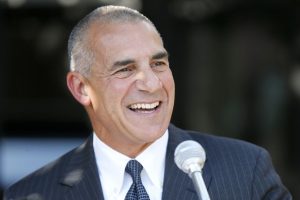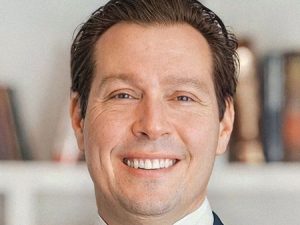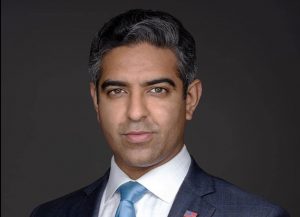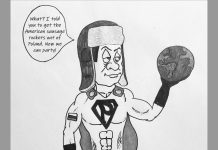In his painfully honest song I’m From New Jersey, the Colonia-born singer-songwriter John Gorka, captured the zeitgeist of his home state eloquently and frankly: “New Jersey people, they will surprise you/’Cause they’re not expected to do too much/They will try harder, they may go further/’Cause they never think that they are good enough.”
On June 8, 2021, four aspiring men will test the waters and the minds and hearts of New Jerseyans in the Republican governor’s primary to see if they are indeed “good enough.” The winner will earn the right on November 2 to take on current Democratic governor Philip Murphy.
Like many primaries, each candidate is seeking to distinguish himself from the others in a Machiavellian effort to convince New Jersey voters they possess the true political bona fides to claim the Republican crown for the Garden State. The question is, what can they offer, and more importantly, how strong is their appeal?
To answer this question, I’ve decided to pursue a symbolic as well as a political analysis of each of these individuals. Specifically, I’m going to break down their political auras using archetypal analysis and simultaneously provide some details about their stances on important issues.
Primary Archetypes
Archetypes, put simply, are images or symbols that have a commonly shared understanding across all cultures. Modern examples include the wise old man or woman (Yoda/Star Wars, Marie Currie, Deborah of the Old the Testament), or the Hero (Captain America, Adonis Johnson (Apollo Creed’s son).
And politics are no exception. This is especially true in the age of 24/7 news coverage and the never-ending bombardment of social media. In this information saturated milieu, people feel overwhelmed by contradictory, seeming inscrutable messages, and as a result, they tend to psychologically downshift, looking for something simpler and emotionally appealing to grab onto.
Images, which are visual aspects of archetypes, serve this purpose perfectly. Nicole Dahmen, Associate Professor at the School of Journalism and Communication at the University of Oregon puts it this way: “Visual communication research has shown that images, especially of political candidates, convey emotions, actions, realism and credibility,” said Dahmen. “These images form a lasting impression in the mind of the voting public.”
Gerry Conway, an American comic book writer known for co-creating the Marvel Comics vigilante antihero the Punisher frames it thus: “Elections are a war of archetypes, not policy or logical argument.” Let’s explore each of the candidates and the archetypes they portend, at least on the surface.
Primary Candidate: Jack Ciattarelli
Jack Ciattarelli— A former member of the New Jersey General Assembly, Ciattarelli represents the Wise Dad/Ruler archetype. The following words from his website resonate this archetype: “It’s time for common sense. It’s time to solve our problems. It’s time to build the New Jersey we deserve.”

His story is one of stability and common-sense ethos: “My wife, Melinda, and I are married 25+ years and have four children. We love New Jersey. I am determined to ensure that our state is a place where we can retire and that my children – and yours – have the opportunity to build their own lives and, one day, raise their own families here. I’m running for Governor with a unique resume and real world experience to fix our broken state.”
This mixture of experience and constancy create an image of dependability and realism that voters will likely find appealing, which is why, according to mycentraljersey.com, Ciattarelli “is the favorite to win the GOP primary on June 8.” Ciattarelli’s sometimes anti-Trump stance bolsters his image as the Wise Dad/Ruler archetype. Ahead of Trump’s 2016 election win, Ciattarelli called the President a “Charlatan” who is “Unfit to be president”.
This attitude will appeal to more moderate conservatives, especially in light of the tragedy and debacle of the January 6 Capitol riot. However, Ciattarelli will have to explain his apparently ambivalent behavior after speaking at a Trump rally. “He’s kind of played both sides with Trump in terms of going against him, but then embracing him,” says Ashley Koning, assistant research professor and director of the Eagleton Center for Public Interest Polling at Rutgers. If Ciattarelli wins the Republican primary scepter, he will need to work hard to distance himself from Trump while not alienating Trump supporters, testing the limits of his Wise Dad/Ruler symbolism.
Ciattarelli’s policy goals may help him accomplish this feat. His campaign highlights the following aspirations:
- Lower Property Taxes—Specifically, Ciattarelli wishes to “lower property taxes to make home ownership more affordable” and “reform the tax code to help families and make New Jersey competitive.”
- Stronger Economy—Ciattarelli aims to “build an open economy to promote growth and opportunity for all” and “upgrade infrastructure to improve safety and facilitate commerce.”
- Rights & Freedoms—Ciattarelli proposes that we “fix our broken immigration system, defend the rights of law-abiding citizens, promote healthy children and families, and secure fair elections.”
- Affordable Healthcare—Ciattarelli seeks to “make healthcare more affordable and protect medical freedom.”
Aside from Ciattarelli’s stance on immigration, his surface appeal is one of moderation, stability, and common-sense fairness that many moderate Republican voters will likely find appealing. His position on same-sex marriage may be problematic in a state that is known for progressive views on a variety of issues. However, in a state beleaguered by the scourge of drug addiction, Ciattarelli’s views may resound with a large swath of voters.
Ciattarelli makes no bones about this pressing issue, stating, “The number one driver of the substance abuse crisis in Montana is methamphetamine, a particularly dangerous drug because of the physiological and psychological effects it has on people. Almost 100% of it comes from Mexico. Until we slow that down or stop it, we have to have all-of-the-above approach. That’s what we’ve been trying to do with the Aid Montana Project, which I would continue working on as governor. We’ve got our hands full. I see it as the number one crisis in our state.”
Primary Candidate: Brian Levine

Brian Levine— The former mayor of Franklin Township New Jersey, Levine represents the Hero/Protector archetype. Levine echoes the Hero/Protector dynamic on his website: “I will defend the Second Amendment rights of law abiding Americans. I believe the law is the law. Elected officials cannot destroy rights guaranteed to us by the Constitution, or use their positions to micro-manage residents. New Jersey’s Second Amendment rights must be upheld.”
And though Levine assumes the mantle of the Hero/Protector, he also has a common-man appeal, separating himself from the Republican wolfpack. Levine avers that the “The people of New Jersey deserve better than the disorder and mess that typical politicians have given our state residents. That is why I am running for governor of New Jersey.” By simultaneously rising above the fray while linking himself with law and order, Levine sends a potentially reassuring message to the electorate.
Unfortunately for Levine, his election website lacks the campaign priorities that Ciattarelli has made sure are clearly articulated. Instead, his site relies on a series of press releases to tell his narrative. And in an age of images and soundbites, that is likely to be problematic. Voters need to know what you stand for in a few pithy, emotionally appealing messages, something glaringly missing from his campaign website. And that is not his only problem. Levine is also a long-shot because he is hampered by his late (April 23) entrance into the primary ballot. As a result, Levine will struggle to gain the media attention needed to make inroads to voters.
As Regina Lawrence, executive director of the University of Oregon’s Agora Journalism Center and George S. Turnbull Portland Center points out, “As hard as it is to believe, the biggest thing that drives elections is simple name recognition. Research has shown that some candidates can be literally left invisible because they can’t win enough interest from the media.” With only a couple of weeks until the primary, the Hero may end up a Zero in the voters’ eyes.
Primary Candidate: Phil Rizzo
Philip Rizzo— Rizzo symbolizes the Builder/Healer archetype. Rizzo’s backstory is redolent of overcoming incredible odds, having lost part of his right arm as a teenager when a lally column in the basement fell on it, severely crushing the artery. Rizzo, and avid athlete, was undeterred.

As his website claims, “But Phil refused to be held back. He went on to play baseball, soccer, and finally High School football, where he was a star on both offense and defense. He received national recognition in 1995, when he earned a scholarship from the National Italian American Sports Hall of Fame, in Chicago. Those physical achievements did not just come naturally. Only those closest to him knew of the commitment, hours of training, and uncommon drive required to succeed.” Such courage is reminiscent of a healer, one who finds a way to ameliorate wounds, and in doing so, transcends expectations.
In line with a healer’s promise to transform, Rizzo also articulates his allegiance to Republican principles of a smaller government that is fiscally responsible on his campaign website:
- Reopen New Jersey-The site argues, “It’s time for the people of New Jersey to get our lives back. Prolonged closures and government mandates are bringing a host of unintended consequences for kids, families, and our economy.”
- Bold Education Reform—Rizzo avers, “We need an education mindset that puts our kids first. We need to take a hard look at our funding and make changes where dollars aren’t being used effectively or making it to the classrooms that need it most.
- Cut Spending, Lower Tax Burden— Rizzo’s site states it plainly: “New Jerseyans are struggling under the weight of high taxes. We must reduce that burden.”
- Rein in Executive Power—The site claims, “The natural tendency of government is to grow and seize power that doesn’t belong to it. Reining in the executive will be a priority.”
- Protect our elections—The site warns, “We must ensure that New Jerseyans, regardless of party, feel that they can trust our core democratic institutions.”
- Stand up for Conservative Values—The site claims, “New Jersey families and New Jerseyans with conservative values have been bullied too long.”
Rizzo’s business experiences best underscore his Builder archetype. After graduating from Villanova University with a B.S. in Business Management, Rizzo went to work in the family real estate development business and then struck his own path, establishing and growing a construction business that built homes across New Jersey and Pennsylvania.
Rizzo embodies the optimism and exuberance of a Healer archetype, stating in a recent interview. “New Jersey has been met with some intense challenges that have tested our optimism and we’re left wondering if life will ever get back to normal. But when I look at our future, I’m hopeful because New Jerseyans are some of the toughest, most resilient people on the planet. I’m confident that with the right leadership, these dark days can quickly become a distant memory. We’re not just going to heal — we’re going to fight.”
Perhaps Rizzo’s most interesting component of his psychological makeup is his transformation to a devoutly religious man. According to his website, “In 2012, he became a pastor, planting City Baptist Church in Hoboken. In 2013, he co-founded a Christian school where he served as school administrator, providing a quality, values-driven education for kids in his community. He left that position in 2019 to plant a second church in North Bergen.”
This pastoral presence may find political purchase in the more conservative New Jersy areas, such as Beachwood, Point Pleasant, and Newton. But this religious background is the proverbial double-edged sword. As pointed out in in a Politico article:
“Phil Rizzo — who leads the tiny City Baptist Church in Hudson County — and his wife, Jennifer, paid $1.55 million in 2015 for a five-bedroom, seven-bath home on six secluded acres in New Vernon, Morris County, about 45 minutes away from the church. Two years later, the Rizzos sold the house for $1.65 million to City Baptist Church. Rizzo has said his family still lives in the house — property-tax free. Public records list it as a property tax-exempt parsonage, saving more than $15,000 in taxes per year in the state that has among the highest property taxes in the country.”
Rizzo defends his decision, declaring, “So our church owns my home, and it is tax free. It’s completely by the book. We had attorneys look at it. We had accountants look at it. It is by the book. I’m not doing anything to save money or to make money that’s going to land me in trouble. … And so we were able to accept the benefit according to the tax law of New Jersey.”
Yet, such financial shenanigans papered over with legalistic language are likely to be frowned upon in a state whose economy has struggled to serve its residents. As reported by USA News, “”New Jersey’s financial problems stem mostly from unfunded retirement obligations that have accumulated over the years.” When working-class folks cannot receive their pensions, they are going to have a jaundiced view of candidates that seem to exploit the very system that has seemingly forgotten about them, regardless of legalistic defenses.
However, his alliance with former President Trump may be a political quagmire that threatens to drag his campaign to the depths of Mordor. As he told nj.com, “I am a strong supporter of President Trump. He did an immense amount to raise up the average American, built a strong economy, and stood up for our values, Constitutional rights and American exceptionalism,” Rizzo said. “Those policies and ideals still work.” Whether these ideals are a boon or an impediment to his campaign remains to be seen.
Primary Candidate: Hirsh Singh
If you find the aforementioned candidates a bit staid and stuffy, look no further than the dark-horse Republican candidate, Hirsh Singh. Although Singh stands on the same political grounds as his traditional Republican adversaries, his persona is anything but traditional. Singh personifies the archetype of Jester/Crazy Uncle.

Singh is an bit of a firebrand who tends to see things in extremes, stating emphatically, “There should be no limitation on your capability to express your freedom…They’re obsessively pounding to their far left ignorant base and they need to keep showing that they’re ‘doing something’ and that’s why they keep trying to slowly but surely take away this freedom altogether. I would undo all that they have done over these last couple of decades. New Jersey used to be an open carry state and we need to return to our fundamentals.”
It is the job of the Jester to expose the foibles and hypocrisies of the established order. And that’s just what Singh did with his political opponents. Singh is suing Governor Murphy, alleging his ‘unconstitutional vote-by-mail election that he forced upon the citizens of New Jersey in 2020.”
And although he is unlikely to win based on precedents of similar cases being dismissed by multiple judges across the United States, Singh avows some bold promises: “Invalidate the 2020 U.S. Senate race and force Cory Booker to run again in 2021” and “Affirm what every Republican knows — that universal vote-by-mail violates Federal law, specifically the Freedom of Information Act.”
Singh has articulated multiple views on his campaign website. Here are a few that are noteworthy:
- Drug Laws and Criminal Reform—Singh states to “avoid creating a massive drug black market, any drug approved for recreational consumption should be minimally taxed.” This common-sense measure will have universal appeal to both marijuana users and fiscal conservatives who worry about government grabbing too much power and cash.
- Medical Malpractice and Tort Reform—Singh wants to “Work to cap malpractice damages so providers can serve larger communities, empower practitioners to recoup economic damages from frivolous lawsuits, and enact appropriate statutes of limitations on claims to eliminate fraud and abuse.”
- Transportation and Infrastructure— Sigh proposes a variety of construction projects, including building a Gateway Tunnel, restarting the blue Commet Train, expanding lanes that connect to Philadelphia, Camden, and Atlantic City, and building a bridge from Cape May to Lewes, DE. And although New Jersy’s primaries are semi-closed, if Singh can pull an upset, such projects will probably garner support from blue-collar/union affiliated voters, many of which are Democrats, in the general gubernatorial election.
However, it is Singh’s outspokenness that has pushed him at times from a Jester to the “Crazy Uncle.” As Conway frames it, Crazy Uncles use “emotion and a blatant appeal to intemperate parts of society.” Dr. Rik Mehta, a biotech entrepreneur, innovator, healthcare policy expert and a licensed pharmacist and attorney, would agree, writing: “Hirsh’s social media account – before he deleted it – was a treasure trove of juvenile rants and embarrassing gaffes. You remember Hirsh’s take on women, right? He said all his problems in life were because of “bitches” and claimed to have “raped” his law school entrance exam – and meant that as a good thing!”
And that’s just the tip of the metaphorical iceberg. According to Mehta, “Hirsh was caught exploiting a loophole in campaign finance law that allowed him to accept a $950,000 loan from his father due to the fact that he lived in his father’s basement.” If Singh wishes to be taken seriously, he is going to have to address these skeletons in his closet. If not, the Crazy Uncle will be asked to politely, or impolitely, leave the Republican family on June 8.
In the end analysis, any successful candidate will have to thread the needle between two New Jerseys, as mystery and thriller novelist Harlan Coben explains: “The state of New Jersey is really two places – terrible cities and wonderful suburbs. I live in the suburbs, the final battleground of the American dream, where people get married and have kids and try to scratch out a happy life for themselves. It’s very romantic in that way, but a bit naïve.”






